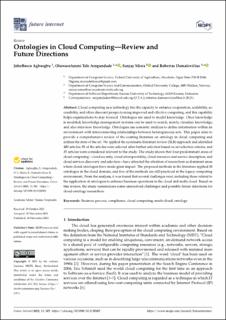Ontologies in Cloud Computing - Review and Future Directions
Peer reviewed, Journal article
Published version
Permanent lenke
https://hdl.handle.net/11250/2975747Utgivelsesdato
2021Metadata
Vis full innførselSamlinger
Sammendrag
Cloud computing as a technology has the capacity to enhance cooperation, scalability, accessibility, and offers discount prospects using improved and effective computing, and this capability helps organizations to stay focused. Ontologies are used to model knowledge. Once knowledge is modeled, knowledge management systems can be used to search, match, visualize knowledge, and also infer new knowledge. Ontologies use semantic analysis to define information within an environment with interconnecting relationships between heterogeneous sets. This paper aims to provide a comprehensive review of the existing literature on ontology in cloud computing and defines the state of the art. We applied the systematic literature review (SLR) approach and identified 400 articles; 58 of the articles were selected after further selection based on set selection criteria, and 35 articles were considered relevant to the study. The study shows that four predominant areas of cloud computing—cloud security, cloud interoperability, cloud resources and service description, and cloud services discovery and selection—have attracted the attention of researchers as dominant areas where cloud ontologies have made great impact. The proposed methods in the literature applied 30 ontologies in the cloud domain, and five of the methods are still practiced in the legacy computing environment. From the analysis, it was found that several challenges exist, including those related to the application of ontologies to enhance business operations in the cloud and multi-cloud. Based on this review, the study summarizes some unresolved challenges and possible future directions for cloud ontology researchers.

